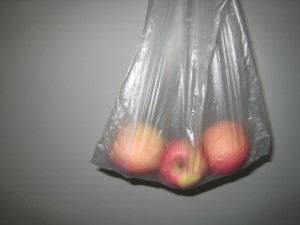Fruit stands are a ubiquitous fixture in cities around the world, and China is no exception. When exploring Beijing, one will see dozens upon dozens of fruit-selling businesses in all shapes or forms. Some will be on the backs of pick-up trucks. Others sell on the sidewalk. Outside of Peking University, a couple works diligently to unload crates of fruit from their van. A woman in a white apron bags up produce while bantering with customers, a wide grin across her face.
Mr. and Mrs. Feng came to Beijing in 2002. Originally from Jiangsu province located on the southern coast of the country, the pair moved to the city, like many other migrant workers, after farming was not providing enough income to support the family. The transition to Beijing life, however, was more difficult than they expected. Later that year, they were forced to return to Jiangsu as the SARS epidemic struck terror into people across Asia and the world.
SARS was only a small setback to the family’s larger plans for success, and in 2003, they returned to Beijing. With no specific job prospects in site, the family began selling street food in various night markets across the city. In 2008, they changed their business and decided to start selling fruit.
On this cloudy day in Beijing, the couple had many customers to attend to. About a block away from the west gate of Peking University, the Feng’s set up their business on the sidewalk. Crates of fruit line the pathway, passersby stopping to examine the brightly colored produce. Business is booming, but that does not mean they can relax and let the fruit sell without encouragement. About15 feet away is another, competing, fruit stand. Although on this day the customers seem to prefer the Feng’s goods, the public is fickle; their warm personality and cheerful manner certainly helps.
Beyond selling delicious fresh fruit and finding work, the family had a much more practical reason for coming to Beijing: the children. In China, the concept of devotion to the family is more than just an idea; it is a concrete part of societal values. Mr. and Mrs. Feng have two children, a son and a daughter. It is these children that much of their future rests on.
The son, 23, works in a library nearby, trying to bring in some money. He is not a large fan of Beijing, and, according to his parents, wishes to move back to the countryside. Their daughter, 21, has a very different mindset. Working as a hairdresser in Beijing, she very much would like to stay in the city. For now, this is where money and possibility resides.
When asked if they wished to return to Jiangsu, Mr. and Mrs. Feng said that while they like Beijing, they would be very happy to go back to a farmer’s lifestyle at home. The chance of this occurring, however, also comes from the children’s actions. “We would maybe go back once the children are married,” explained Mrs. Feng. Beyond basic aspects of filial piety, even the relationships of children can be determining factors for parental decision-making.
This puts a sizable amount of stress on the couple; at the moment, they are working to support the family. On a good day, the Feng’s pull in about 200 RMB, but there are many other conditions that can impair sales, from bad weather to slow crowds. Therefore, they will continue to work hard and expect the children to do the same.
One thing that we can all learn from the Feng’s is optimism and positivity. Even in a difficult situation, relying on the decisions of children, Mr. and Mrs. Feng radiate positivity. From the smile with which they greet customers to the hearty laughter coming from friendly conversations, being migrant workers in Beijing does not stop their enjoyment of life.
The children may get married soon, or they may not. For the time being, the Feng’s will continue to set up their stand by the University, brightening even the smoggiest of days with sweet fruit and good attitudes.
